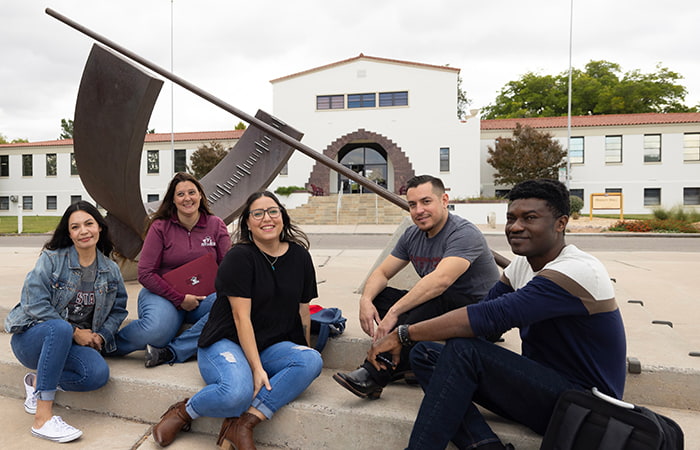7 Tips on How to Choose a Major
How do I decide my major? If you’re asking yourself this question right now, don’t worry — you’re not alone. It’s generally estimated that about half of college students begin their academic journey undeclared 1.
Moreover, according to a BestColleges survey 2, 61% of college graduates would opt to change their major if they could go back. The idea that you may not have chosen the right major for your goals can weigh heavily as you invest thousands into your education.
It’s important to note that it’s totally normal to start college with some uncertainty. This is especially true if you find a great university that gives you a variety of options for degree pathways.
NMSU Global Campus is one of those schools. We offer over 90 accredited degree and certificate programs, all of which are designed to help you succeed in your desired field. With affordable tuition and a 100% online modality, we make sure you have access to a high-quality education as soon as you’re ready to take the first step.

Why Choosing a Major Is Important
Even though you’re in good company, it still is best to figure out your major sooner rather than later. You’ll be saving time and money by avoiding unnecessary courses, and you’ll have a clear path to graduation. According to an article in NBC News 3, the U.S. Department of Education reported that fewer than two-thirds of students in college will manage to finish their degree within six years.
Choosing a major early also provides you with opportunities to build a deeper understanding of your chosen field. This can be invaluable when seeking internships, networking opportunities, or participating in relevant extracurricular activities.
Aligning your academic focus with your career aspirations allows you to tailor your learning experience, gaining both the theoretical and practical knowledge needed to excel in your future profession. With the right major, you can also explore certifications, specialized coursework, or projects that further enhance your employability and make your resume stand out to potential employers.
How Does My Major Impact My Career Options?
A great bachelor’s program will set you up for success in a variety of ways:
- Essential Career Skills: Having a degree on your resume is proof for potential employers that you have the foundational skills you need in your field.
- Networking Opportunities: Professors can be a great resource for contacts or letters of recommendation, and your fellow classmates can advocate for you if they end up at a great company when you graduate.
- Preparation for Graduate School: Many jobs, particularly in STEM-related fields, require a master’s degree to stand out in the market. Having a relevant bachelor’s degree is often a prerequisite for graduate programs.
If you’re feeling overwhelmed about how to choose a major, we’re here to help. Let’s explore seven tips to get you on the right path.
7 Tips on How to Choose a Major
1. Explore Career Options
- Why: If you want to figure out what subject to major in, you should first consider what kind of job you want to have. Knowing your ideal career can help you make a smart decision about your degree.
- How: Make a list of important things you want from your future career. Do you see yourself working in a fast-paced setting that gives you a strong sense of purpose? Do you have an independent, entrepreneurial drive? These are just a couple of questions you can ask yourself as you make your list.
If you need help brainstorming, the U.S. Department of Labor has a search tool you can use to learn more about different types of jobs and what they entail.
2. Pursue Your Interests
- Why: Studying something you’re interested in will help you stay motivated on your path to a degree. Finding your passion will keep you on track to graduation, and it will set you up for a career you find fulfilling.
- How: Consider taking a career assessment to gauge your interests. My Next Move offers a free one to help you find a potential career path. Once you have a specific vision for your future, you’ll have an easier time finding a degree program to match it.
3. Consider Your Strengths
- Why: Everybody is skilled at something, even if it’s not an academic field. The key is translating that skill into something marketable in the professional world.
- How: Think about past accomplishments you’re proud of. This could be something school-related, like a math test or an essay competition. Or, perhaps you’re a great listener, and you’re proud of being a supportive friend. These are skills you could apply to a fulfilling career in counseling or therapy.
4. Research Job Outlooks
- Why: If you’re struggling to come up with ideas on what kind of career you want to have, you can always find some direction by looking at median salaries and potential job outlooks.
- How: The U.S. Bureau of Labor Statistics has an Occupational Outlook Handbook that breaks down key data on a variety of professions. For instance, BLS projects that information security analysts will see a job growth of 33% 4 by 2033, and they have an average median salary of $120,360 per year.
5. Gain Hands-On Experience
- Why: There’s no better way to determine if a field is right for you than by trying it out firsthand through internships or job shadowing.
- How: Internships are available in nearly every field, from business and education to government, healthcare, media, and more. You could use this as a low-stakes trial run of a career — if it doesn’t go well, you’ll know the field isn’t right for you. If it does go well, you’ll have a solid lead on what to major in (and boost your resume or CV in the process).
Another option for practical experience is job shadowing, where you observe a professional in their field to get a realistic sense of job duties and required skills. Plus, you could get advice from your mentor about what major would be most relevant to the job.
6. Sample a Subject With Microlearning
- Why: You can try out your compatibility with a field by taking a microlearning course. These courses give you bite-sized knowledge to help you grow a specific skill. This can give you a sense of whether you find the direction interesting without having to commit to a full degree program.
- How: At NMSU Global Campus, we offer a variety of microlearning courses that give you precise skills to broaden your professional toolkit for an advantage in the job market. You’ll also earn a certificate or digital badge once you complete the course, so you’ll have a verifiable and valuable addition to your resume or CV.
If you’d like to get a sample of how microlearning courses work, check out our free Building Your Bridge2Careers course. It’s a great way to see the value of microlearning courses and, in the process, get extra guidance on how to find your ideal career.
7. Talk to an Advisor
- Why: Perhaps the most useful tactic for finding a major is getting expert advice. Good universities have knowledgeable advisors, and they can talk you through your various interests to help you find a degree program that you’ll thrive in.
- How: At NMSU Global Campus, we’re here to support you from day one all the way to graduation. As soon as you get accepted, you’ll be assigned an academic advisor who will be there to answer any questions you have. That means helping you find the right degree program — or helping you change majors if you find one that suits you better.
Don’t Put Too Much Pressure on Yourself
Choosing your major is an important decision, and there are benefits to knowing your degree program from the very beginning. But as we’ve seen from the data, it is totally normal to change directions if your original choice doesn’t work out.
In fact, it’s better to adjust your major to fit with your evolving goals. So don’t be too hard on yourself if you don’t immediately know what you want to do!
No matter what direction you choose, NMSU Global Campus is here to help you on your journey. If you’re ready to see how we can help you make your academic dreams come true, take the first step and apply for free today.
References
1. Nelson, Vicki. “How to Help Your Undecided Student Find Direction.” College Parent Central, 28 October 2021.
2. Johnson, Reece. “New Survey Finds Most College Grads Would Change Majors.” BestColleges, 20 March 2023.
3. Marcus, Jon. “Most College Students Don’t Graduate in 4 Years, so the Government Counts 6 Years as ‘Success.’” NBC News, 10 October 2021.
4. “Occupational Outlook Handbook: Information Security Analysts.” U.S. Bureau of Labor Statistics, last updated 29 August 2024.
About New Mexico State University Global Campus

At NMSU Global Campus, our mission is to help prepare the next generation of leaders. We focus on offering high-quality education that spans a multitude of disciplines and career pathways. Whether you’re seeking a degree or certification in teaching, science, engineering, healthcare, business, or others, we provide exciting opportunities that can help shape your future.
New Mexico State University is accredited by the Higher Learning Commission, an institutional accreditation agency recognized by the U.S. Department of Education. Specialized accreditation from other accrediting agencies is also granted for some programs. We offer flexible, career-focused 100% online courses and degree options in New Mexico, across the nation, and around the globe. Start your journey with our accessible and affordable degree options.



